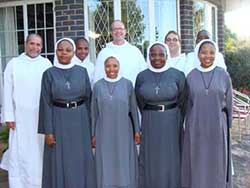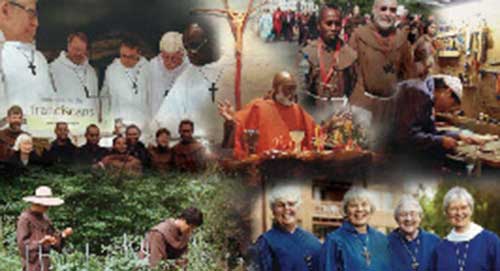I was in the congregation at a parish Eucharist recently – not a huge congregation, maybe around a hundred. There was a good age range. Young people were having fun leading music with a ukulele group. A sister from the Community of the Sacred name was towards the back. A Franciscan brother was preaching. There were single people, separated people, widows, widowers, couples, young marrieds with no children, grandparents, young families… Isn’t this how it should be? Isn’t this how, in most places it could be? Why is it too often not like this?
Sometimes, is there so much of a focus on identifying our inclusivity or exclusivity around gender and sexuality that other spectrums become invisible; that other ways of “classifying” people is ignored?

I was recently on retreat at the New Zealand Cistercian monastery. There is something irreplaceable about a community of celibates – around them there are companions, guests, and associates; and the monks are leading contemplative life – they aren’t merely doing this in our stead. Then I was blessed to visit, for the first time, St Isaac’s Retreat in Opononi, and spend time with Sr Anne of the Sisters of the Love of God.
What is it about Kiwi culture that religious life has such a weak track record here? The beauty of our country, many would think, should naturally lead to deep spirituality and a contemplative bedrock – but on sunny days, where do you find most kiwis congregating – in a park, forest, beach? No, go and try and get a car-park in one of our many, many, many shopping malls!




Absolutely
The hegemony of Coupledom is one of the constant irritations of mine with the church
All too often the widowed, to take but one example, fall off the social radar
it strikes me that ‘inclusivity’ agendas which are not on the whole to do with congregational life do miss this sort of thing entirely
Perhaps because it is easier to talk in these slightly more abstract terms than face hard questions about our Sunday by Sunday (and hopefully also through the week) common life as the church
As to monasticism and the contemplative life – and the mall, my obesrvation as an outsider recently transplanted is that perhaps it is the lack of historic depth that in some sense means there is a weak track record?? Simply put Christianity hasn’t been here long enough??
And the Mall SHOUTS in a western secular culture (in which the Great Outdoors is something which we are taught to Consume, not contemplate . . . (there might be the seed of a thought here??)
Apologies – somewhat rambling and disconnected thoughts in response to a rich blog
Thank you, Bosco!
Eric, not rambling at all, IMO. And thanks for seeing it as a rich post. I have the ideas buzzing in my head, and struggled to put them down here – so I’m so pleased that you, at least, got the sort of thing I was trying to reflect about. As to Christianity not having been here long enough yet – I guess we won’t be here to see how that pans out. But it is possible there is also an element about the timing of Christianity coming here – and where Christianity was at in the nineteenth century. Certainly, we have not yet discovered/created a southern-hemisphere incarnation of our faith. Blessings.
I think it is perhaps ‘discover’ vs ‘create’?? The NZPB seems to me an attempt to create, a bit forced?? So good in parts . . . I’m not yet all that conversant with the history of it but it does have the feel of ‘lets make our own!’ I know prayer books don’t fall out of the trees 🙂 but there needs perhaps to be a waiting to discover, rather than a rush to create.
I’m of the theological disposition that says the creating has been done, we are called to discovery 🙂
just a(nother) thought
That fits in, Eric, with my regular stressing that the Prayer Book is/”should be” descriptive, not prescriptive; describing what Christians do when we meet and worship. Blessings.
I am about to spend some days with Mother Keleni for my pre-Ordination retreat. I cannot think of a better place / cadre for this, and I am looking forward to it immensely.
And as for women later in life who find themselves alone, have you ever visited the Beguinage in Brussels? Truly an example that would translate relatively seamlessly toour 21st century context.
Peace, Bosco.
Yes, Barbara, I have been to begijnhofs (beguinages). Would love to see someone start the translating. God’s blessings on your retreat.
You ask, “What is it about Kiwi culture that religious life has such a weak track record here?”
Probably not enough suffering has occurred here. People have too much faith in man.
I cannot speak to the culture in your corner of the world. I can say that there is an almost complete ignorance and therefore a lack of appreciation for the witness of religious life in the US. Perhaps you have identified the core of the problem – “the mall”.
It seems to me that those who are drawn (called?) to the path of religious life are those who have come to understand that consumerism is a dead end. There is also a lack of understanding and appreciation of religious vocations among clergy (at least in the US). Do they see vowed religious as a threat?
Perhaps religious life everywhere has such a “weak track record” because it is viewed as just another “choice” in an individualistic, consumer culture rather than as a call to serve others. I stumbled into religious life because I was seeking spiritual fulfillment on a personal level. I discovered that it is “not all about me”. Thanks for the insightful and courageous post.
Thanks, Br Bo, for your insight in a different, but as you say similar, context. What a fascinating thought, that some might see religious life as a threat. Blessings.
I have been impressed with the growing number of new religious communities in the USA, as well as with the continued vitality of established communities and their associates\tertiaries. In the parish where I was rector just before retiring, we had a Franciscan tertiary and an oblate of the Julians. Living near the monastery of the Society of Saint John the Evangelist, I have the opportunity to worship there. The congregation at the Tuesday evening celebration is diverse and the conversations between the brothers and guests after the liturgy indicate strong friendships. The brothers outreach to students in the city is also worth noting.
Thanks, Daniel, for these positive stories. Blessings.